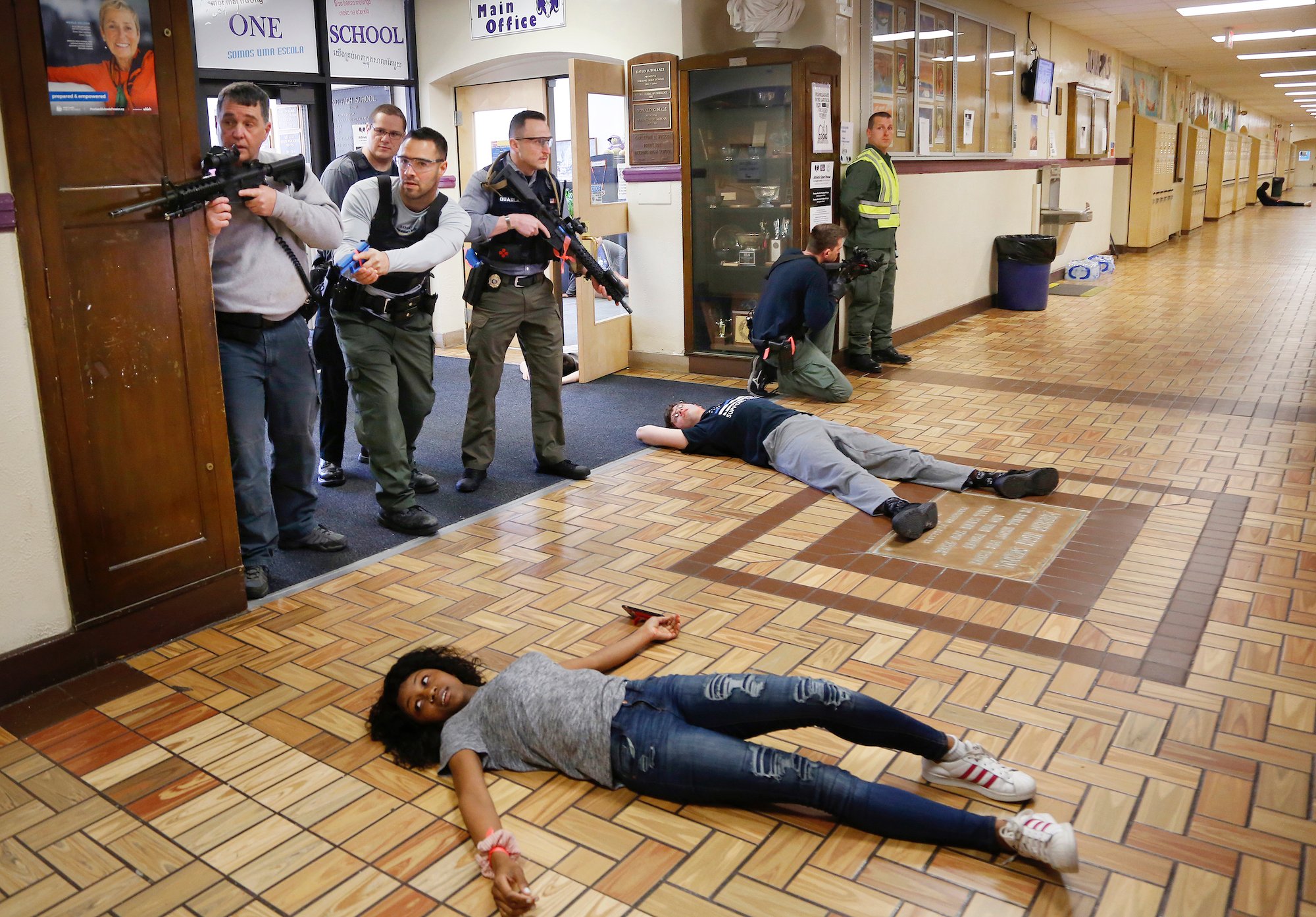Good morning, Bulletin readers. The country’s two largest teachers groups, with a combined 4.6 million members, issued a strong rebuke of active shooter drills that risk traumatizing students. Read on for links to The Trace stories that found significant problems with the exercises.
Receive this daily news briefing by email every morning. Sign up here.
WHAT TO KNOW TODAY
Top teachers unions oppose active shooter trainings for students. In a white paper prepared with the gun reform group Everytown for Gun Safety, the American Federation of Teachers and the National Education Association came out against drills that involve students and are unplanned or simulate violence. From our journalists: Last year, The Trace and HuffPost published an investigation into ALICE, a leading active shooter training firm and an early proponent of having teachers and students confront gunmen. Our reporting found little evidence that the company’s approach works. And in an audio story with Slate, we spoke to students to learn what they see, hear, and feel during lockdown drills. (Everytown provides grants to The Trace through its nonpolitical arm. Here’s our list of major donors and our policy on editorial independence.)
President Trump’s 2021 budget calls for ending CDC funding for gun violence research. In December, Congress approved $25 million to study gun violence as part of a bipartisan spending deal, marking the first time in more than two decades that federal dollars were designated for that purpose. The president’s spending proposal would eliminate the Centers for Disease Control and Prevention’s share of the funds next year. The White House’s budget also proposes splitting up the Bureau of Alcohol, Tobacco, Firearms and Explosives by transferring its alcohol and tobacco-related functions to the Treasury Department and “allowing ATF to focus exclusively on its firearms and explosives mandates.” (The Trump administration proposed the same thing last year and the year before.) Presidential budgets indicate ideological and policy priorities, but it’s Congress that assembles actual spending packages.
To stoke his base, Trump is going all in on gun rights. The AP reports from the campaign trail, where the president is warning supporters that Democrats are angling to take their guns, “reliably drawing boos and hisses for his to-be-determined opponent.” The message belies Trump’s own calls for stronger background checks after last summer’s mass shootings in Ohio and Texas, or the scolding he gave GOP lawmakers he said were “scared” to buck National Rifle Association influence after Parkland.
Assault weapons ban narrowly passes Virginia House. In a 51-48 vote that fell largely along party lines, the House of Delegates advanced a ban on the sale and purchase of assault firearms. The measure now moves to the more moderate state Senate, where an earlier iteration was withdrawn last month. How the House bill accommodates gun owners: It exempts existing assault-style weapons and allows for their shared use at gun ranges and gifts to immediate family members. Also Tuesday: The state Senate, which has passed five of the bills in the governor’s reform package, rejected a measure to require firearm owners to report stolen or lost guns.
PayPal will fund research into illegal gun transactions. The company is joining with criminologists at Northeastern University and the University of Chicago Crime Lab to study the payment methods used in unsanctioned gun sales, Reuters reported. PayPal already bans people from using its service to buy guns. “We hope to establish a new area of study that could have major policy implications — how illegally sourced guns are financed,” said Anthony Braga, who is leading the research effort.
South Florida police have seized hundreds of weapons since the enactment of the state’s red flag law. In the year after the law was passed in March 2018, police in Broward County – which is home to Parkland – filed 255 petitions and seized 412 guns, per a new report from Giffords Law Center. Fifty-five percent of cases involved homicide threats and 48 percent involved suicide threats. Nearly one in five concerned a threat to attack a public place.
Going door-to-door to stop the gunfire in Kansas City. A group called KC Mothers in Charge, comprised mostly of women who’ve lost kids to gun violence, announced the launch of an outreach initiative that makes home visits in eight of the Missouri city’s most at-risk neighborhoods. The drop-ins aim to break taboos around talking to police about criminal activity.
DATA POINT
Among a year’s worth of extreme risk protection petitions filed in Broward County, Florida, judges granted final orders, which can last up to a year, 87 percent of the time. — Giffords Law Center

